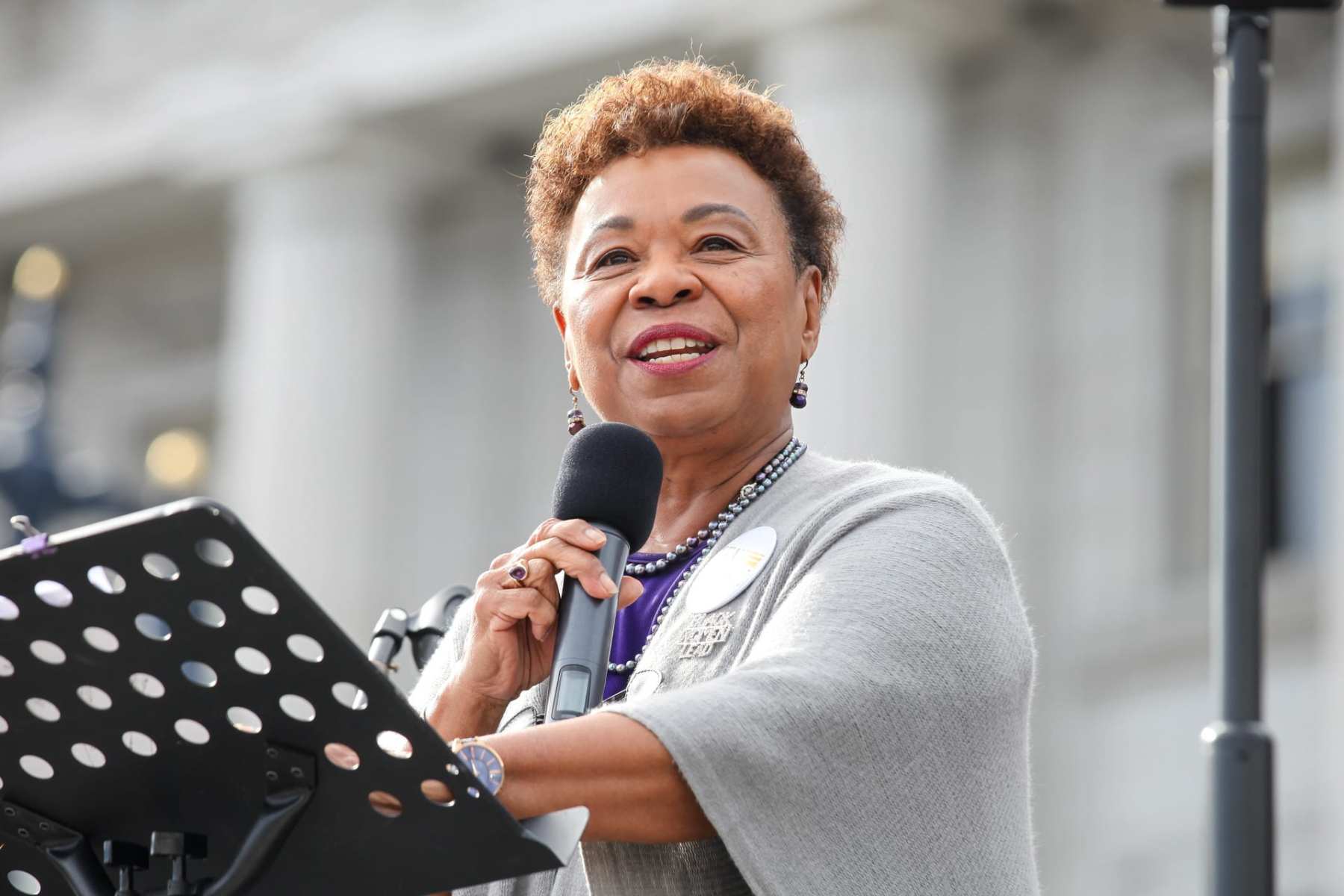We’re the only newsroom dedicated to writing about gender, politics and policy. Subscribe to our newsletter today.
California Democratic Rep. Barbara Lee is among the names being considered to replace Sen. Kamala Harris as she heads to the White House to serve as the first woman vice president of the United States.
Lee, currently in her 12th term in the U.S. House of Representatives, is the highest-ranking Black woman in Congress as co-chair of the steering and policy committee — a position she was appointed to by Speaker Nancy Pelosi after narrowly losing her bid for Democratic Caucus Chair. Lee got her start in politics as a college student who volunteered to work on Shirley Chisholm’s pioneering campaign for president in 1972.
California Gov. Gavin Newsom, a Democrat, will fill Harris’ vacancy. The 19th’s editor-at-large, Errin Haines, spoke to Lee on Saturday about her future and what’s next for Black women in political leadership after a year that saw record turnout, organizing and candidacies for public office for the vanguard constituency of the Democratic Party.
This interview has been edited for length and clarity.
You are somebody who is certainly in the conversation right now, so I want to talk to you about that and the future of Black women’s political power now, and people coming around to the reality that they should be following Black women’s leadership.
I got involved in politics through the presidential campaign of the first African American woman … We have thought, we’ve dreamed about this moment, but we’ve also worked for it.
I know this is a year in which we’ve seen the importance of representation in our politics. Kamala Harris launched her own campaign last year in the spirit of Shirley Chisholm. Talk a little bit about the importance of more women — and Black women, in particular — running for elected office, something I know Chisholm talked about. What do you think about where we are in this moment and where we should be going from here?
I was there when [Harris] kicked off her campaign, and I was so honored to co-chair her California presidential campaign. So for me personally, this is just a remarkable moment. And what it says, I think, is, finally! Black women have been smart, we’ve been strategic, we’ve helped elect so many candidates to public office, and we’ve always brought other Black women and other women of color with us. And so this is such a historic occasion for Black women and women of color. But it also says that more women will be able to break through and it will be a heck of a lot easier [to do so].
Sticking with the theme of representation matters: Kamala Harris breaking that barrier in California, to become the state’s first Black senator, first Black woman senator, and now she’s the only Black woman currently serving in the U.S. Senate. What has that representation meant?
With Sen. Harris in the Senate — I’ve worked with her on a variety of issues such as, for instance, the Hyde Amendment — it’s about racial justice for Black women of color, low-income women as it relates to reproductive justice. She understands why this policy has been so destructive and discriminatory against women of color and low-income women.
[Like] when you look at marijuana justice, when you look at the numbers of Black and brown people who have been incarcerated and have these drug charges, which have just stopped them, and been a barrier to moving forward with their lives.
So representation, it really does matter, because the lens by which you look at policies are lenses that others don’t have. And that’s because of who we are, our experiences and the pathways that we have had to walk and run to get to where we are. And so, you know, there’s a void when there are not the perspectives and the input and the leadership of Black women.
Yeah, absolutely. And so obviously, when [Harris] vacates that seat, there will be a void. I know you have a relationship with her. Have you spoken to the vice president-elect about when she might be vacating that seat?
Oh, no, no, no. It’s probably still too early. I don’t know, I have no idea. And I haven’t even seen any press reports. I mean, I’ve heard from her, but not about that.
Has she even given you any indication of who she might like to see as her successor?
No.
Other people have already told me they want to see you as her successor. So, I have to ask you, is a job that you are interested in?
Well, there’s several African American women who would meet the test and who would be phenomenal in the Senate. I would be honored. Because you know, public service for Black women is not just about being elected; that’s another platform and framework for public service. The governor will make his decision. We will respect his decision, because he has to determine who he thinks best will serve California, he has to take into all of his considerations, and come up with his conclusion as to who he thinks would best fill that void and who would be able to work with him as we move forward on our California agenda. So it’s up to him, quite frankly, but I know that there are several African American women on the list who are fully prepared and could serve.
If it’s not you, do you still think that whoever the next senator of California is should be a Black woman? I know, there’s been some conversation about making history with say, the first Latino to represent California…
The void that Senator Harris would leave as an African American woman is a huge void. Not speaking to any other issue or making this about beating up anyone else. It’s about the void and the fact that since the first Senate session, I believe, African American women have had a total of about 10 years with Sen. Carol Moseley Braun. So 10 years out of hundreds of years. And so this void and this gap would be tremendous. I believe that the governor will take that into consideration.
I know that you have a relationship with President Elect Biden. And so I’m just wondering what you’ve also if you’ve had a chance to speak with him, and what you’ve told him about the Black women that you’d like to see help him govern.
In the House and throughout the country, in the state legislatures, there are some brilliant and phenomenal African American women who could serve as cabinet officials. How many women do we have in the Congressional Black Caucus? All of us could serve in the cabinet. I know one consideration, of course, is making sure that the seats do not go, if they were vacated, to Republicans, but for the most part, most of the seats are strong Democratic seats. And so I think this provides a real opportunity for African American women in the House of Representatives to serve in a variety of positions.
My good friend of many years, [Ohio Democratic] Congresswoman Marcia Fudge for secretary of agriculture. I work with her — I’m on the appropriations committee, and I’m on the subcommittee on agriculture — and so I’ve had the privilege to not only work with Marcia as a colleague, but she’s a good friend. There’s nobody who knows ag issues like Congresswoman Fudge and I think she would be phenomenal as a secretary of ag, and I’m certain that her district would elect another Democrat to that seat.
Sticking with the House for a minute: Who are the other Black women that you would like to see in elected House leadership?
I think that it’s time. I think that those of us who run in the past, we’ve shattered some of those glass ceilings. And we’ve broken some of those barriers, even though we may not have won the election. I think that now, more members see that the capacity, capabilities, the value and the strategic positioning and how Black women really do have the ability to help unite the caucus and bring [it] together. And so, yes, several are running. And, you know, I’m hoping that they win and I’m going to help.
If you are not headed to the Senate or headed to the cabinet, you were discussed for Speaker of the House after the historic 2018 midterms. I know how much respect you have, among your colleagues, and especially some of the younger women of color that you have mentored. Are you considering running this time? And is it time for a Black woman to hold that gavel?
I don’t think anyone could do what Speaker Pelosi has done in keeping this caucus together and winning elections. And I fully support her. When you look at Speaker Pelosi’s history and record, she’s probably been the greatest speaker ever because she’s had the most diverse caucus. And she has had the ability to raise money to make sure we elect more Democrats. She has supported women of color to assume committee chairs and vice chairs of committees. And so I think that, you know, I mean, I know she’s gonna be reelected, and I’m working to make sure that she is reelected as our speaker.
On her historic speakership: What do you think that has done to help this country’s political imagination around women in power?
It has shown that women lead and women lead on each and every issue, not only issues perceived as women’s issues, but every issue. And I think it’s also shown that especially with Speaker Pelosi, that racial equity matters. And that racial inclusion in the House of Representatives is an asset. And that we are able, and she has seen, especially with African American women and women of color in the House, how we work and how our legislative efforts really move forward, because we work with everyone, because we know that what’s good for women, and for our communities, as women of color for low-income communities.
I mean, she appointed me to chair the majority leader’s task force on poverty and opportunity, for example. She always talks about how she came to Congress—because one in five children live below the poverty line. Her keen understanding of those issues, that poverty not only affects women, it affects families, it affects children, it affects everyone across the board. African Americans have the highest percentage, but this is low-income, working families, poor, White families.
Speaker Pelosi has been able to see the issues that I want to champion, such as lifting people out of poverty … On COVID, I negotiated this in the HEROES bill targeting resources for Black and brown communities to deal with contact tracing and testing and follow up isolation and health care. She understood this, and we worked together to negotiate that. Her impact is broad and deep. And as a Black woman, I’ve been able to really help, not only my community, but all across the country on so many issues, because she understood it, and she got it.
And now we’re going to have one of us as vice president in the White House. This has taken a lot of blood, sweat and tears, a lot of work. And a lot of hope that we never lost sight of what we were working for and toward and, you know, this is just a major milestone for everybody.






